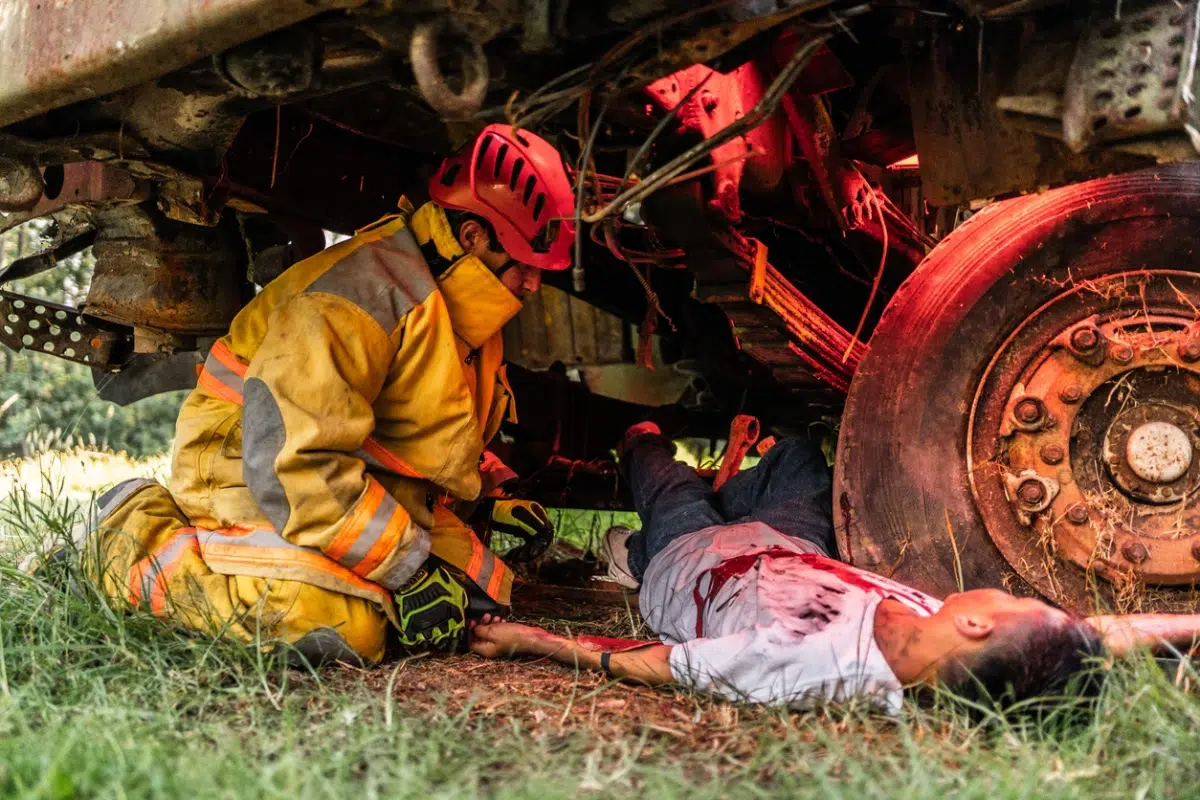
Of all the types of accidents that happen on the roads, those that involve commercial trucks are some of the most devastating. A fully loaded truck can weigh up to 40 tons — that’s the equivalent of about 20 regular passenger cars.
Given their sheer size and weight, they often leave victims with serious, life-altering injuries that need extensive medical treatment and rehab and often require legal action to secure compensation.
Understanding the common types of trucking accident injuries (such as concussions and burns) is critical for both victims and their loved ones. With this information, they’ll be able to recognize symptoms early on, understand the care they’ll need, and know what legal steps they can take to recover their losses with the help of a personal injury attorney.
Types of Injuries in Truck Accidents
Truck accidents cause a wide range of different injuries. These types of crashes are far more dangerous than regular car collisions because even seemingly minor physical trauma can leave victims with long-term disabilities.
Head and Brain Injuries
The force behind truck accidents can easily cause a sudden jolt or blow to the head. Traumatic brain injuries range from mild concussions to severe brain damage that permanently alters a person’s speech, memory, and motor functions.
Even “mild” traumatic brain injuries can cause problems for a long time. People often deal with headaches, trouble with concentration, mood swings, and difficulty sleeping.
More severe cases lead to brain swelling, brain bleeds, and neurological damage that can’t be undone. Some victims even lose their ability to work or do regular everyday tasks, and their overall quality of life is negatively affected.
Spinal Cord Injuries (SCIs)
Truck accidents can exert more than enough force to cause spinal cord damage. The severity of an SCI depends on where it’s located and the extent of the damage, but partial (or even complete) paralysis is an unfortunate reality for many who find themselves in this situation.
Even if this doesn’t happen, victims often deal with chronic pain, loss of sensation, and limited mobility. Treatment of spinal cord injuries usually requires extensive rehab, assistive devices, and in-home care, and they quickly become financially and emotionally overwhelming to cope with.
Broken Bones
Broken bones are common in regular car accidents, but they’re even more so in truck crashes. Some breaks heal in time, but severe injuries can lead to permanent complications like nerve damage, mobility problems, and chronic pain.
Besides the typical bone fractures in the arms and legs, many victims suffer pelvic fractures, which can cause internal injuries. Broken ribs are also common in truck accidents because of the pressure from seat belts and direct impacts. Rib fractures can also cause life-threatening damage to the lungs if not treated immediately.
Internal Injuries and Organ Damage
Blunt force trauma to the abdomen and chest can lead to internal bleeding and damage to vital organs, but such injuries aren’t always immediately obvious. The liver, spleen, kidneys, and lungs are all vulnerable, and trauma to any one of them can create serious problems.
Victims should always get checked out at the hospital immediately after a truck accident, regardless of whether they feel fine or not.
Neck Injuries
Whiplash is perhaps one of the most common neck injuries in any vehicle accident. It’s usually associated with minor car accidents, but any collision where the head is violently jerked forward and backward can cause it. The injury can often heal on its own over time, but severe cases might need physical therapy, pain management, and even surgery.
Burn Injuries
When truck accidents involve a fire, explosion, or hazardous materials, victims can easily suffer serious burns. Regardless of their severity, burns need to be treated and watched carefully to avoid secondary problems with infections.
Severe injuries often need skin grafts, reconstructive surgery, and long-term pain management. It’s an emotionally and physically grueling process.
Cuts and Soft Tissue Injuries
Truck accidents can cause deep cuts and lacerations from shattered glass, twisted metal, and flying debris. Some cuts, of course, are minor and might only need stitches. However, severe ones can lead to nerve damage and permanent scarring, and they can easily get infected if they’re not cleaned and treated properly.
Soft tissue injuries involve torn ligaments, muscle sprains, and tendon damage, and they can be equally debilitating. Damage to the knees, back, and shoulders usually needs physical therapy and can take months to heal.
Amputations
Accidents with large commercial trucks all too often lead to traumatic amputations, where a limb is severed at the scene of the crash. Even if that doesn’t happen, limbs can be crushed badly enough that they can’t be saved and need to be surgically removed. Victims face lifelong physical and emotional challenges and must adapt to their new reality.
Psychological Trauma
Even if the physical damage is minimal, many victims suffer from post-traumatic stress disorder (PTSD) and anxiety in the aftermath of the crash. The emotional toll is often overlooked but can be just as crippling as any physical injury. Some people need years of therapy and medication to cope with the trauma.
Factors Contributing to Injuries in Truck Accidents
While truck accidents are inherently dangerous, several factors influence how severely people get hurt.
Impact Force and Speed
The weight and momentum of a commercial truck greatly increase the force of impact in a crash. Compared to the average 3,000-4,000 pound vehicle, semi-trucks can weigh up to 80,000 pounds when fully loaded. Such an enormous weight difference means that even low-speed accidents can cause catastrophic injuries.
Additionally, big rigs need 20-40% longer stopping distances than regular cars. That distance only increases if it’s raining, snowing, or the weather is otherwise less than ideal. When a truck driver is going at highway speeds, even a slight delay in braking can turn a minor crash into a major disaster.
Type of Collision
A truck crashing into a smaller vehicle from behind can easily be fatal, especially if the car is crushed under the truck. Should the trailer swing outward, it can make the truck jackknife and cause multi-vehicle pileups. If a truck tips over in a sharp turn or because its load isn’t balanced, it can crush nearby cars and trap the people inside.
Underride truck accidents are one of the deadliest types of crashes. It happens when a smaller vehicle slides underneath the truck’s trailer. The smaller car tends to get stuck or have its roof sheared off. Unfortunately, these often lead to fatal head injuries as well as spinal cord injuries.
Because underride crashes have the potential to be so deadly, the federal government now requires all semis to have rear underride guards (also called Mansfield bars, after actress Jayne Mansfield, who was killed in just such an accident.)
However, side underride guards aren’t federally regulated, so the risk is still very much there. Some truck companies voluntarily install them; many do not.
Cargo Load
Trucks with overloaded or improperly secured cargo are unstable, making them more prone to rollovers, jackknifes, or losing their loads on the road. Excess weight can also increase the risk of mechanical failure because it puts a lot of strain on the truck’s brakes, tires, and suspension.
Additionally, some trucks carry flammable liquids, explosives, toxic chemicals, and other dangerous materials. In an accident, these substances can ignite, explode, or release dangerous fumes. Victims are often left with severe burns, lung problems, and toxic exposure.
Spills from hazardous cargo can also require costly cleanup efforts and even force road closures or evacuations to protect public safety.
Lack of Safety Features
Modern trucks come equipped with advanced safety technology like automatic brakes and lane departure warnings. However, not every trucking company invests in these upgrades. Poorly kept brakes, tires, lights, and suspension also increase the chances of accidents should those parts fail while the rig is on the road.
Human Error
Truckers have demanding schedules, and they might end up driving for longer than they’re legally allowed to do. Far too many truck drivers are tired behind the wheel, and fatigue impairs judgment and reaction time.
Other human errors like speeding, distraction, and impaired driving also contribute to an uptick in crashes and severe injuries in truck accidents.
Medical Attention and Recovery
Just as in regular car crashes, not all injuries show up immediately after a collision with a truck. That’s why it’s so important for victims to get checked out at the hospital immediately, even if they don’t think they’re hurt.
Physical trauma like internal injuries, concussions, soft tissue injuries, and bleeding can be sneaky and take days to really show up. A full medical evaluation with X-rays, MRIs, and CT scans will help find those hidden issues.
Depending on the severity of their injuries, victims might need:
- Hospitalization and intensive care for severe trauma
- Pain management with medication or injections
- Physical therapy to regain strength and mobility
- Follow-up appointments and surgeries to handle any secondary complications
For victims of serious trucking accident injuries, recovery may be about adapting to a new normal. They may have to learn to cope with chronic pain, permanent limitations to their mobility, and cognitive impairment from head injuries. Then there’s the emotional fallout, which can take just as long (if not longer) to recover from.
Seeking Compensation and Justice
Hospital bills lost time from work, and emotional suffering can leave victims of truck accidents and their families financially devastated. Fortunately, those affected may be able to collect compensation to help them rebuild their lives.
Victims of truck accidents can pursue compensation in several categories, including:
- Medical Costs: Damages for emergency care, rehab, surgeries, therapy, and long-term treatment
- Lost Wages: For when the victim can’t work in the same capacity
- Lost Earning Capacity: For when the victim can’t return to work at all
- Pain and Suffering: Compensation for physical pain, emotional trauma, decreased quality of life
In order to get compensation, victims need to be able to prove that their injuries were caused by negligent behavior.
An experienced truck accident attorney can help them collect the evidence they need to do that. Depending on the circumstances, it may involve accident reports, medical records, black box data, eyewitness statements, and expert testimony.
Truck accident claims are generally more complicated than regular car crashes. Multiple parties could be liable, not just the driver, and laws from the Federal Motor Carrier Safety Administration come into play as well.
Truck companies also often have aggressive legal teams and insurance carriers who are focused on reducing their payouts, so they’ll pull out all the stops to pressure victims into taking lowball settlement offers.
A personal injury attorney with experience in trucking accident injuries can take a lot of the legal stress off your shoulders. They’ll negotiate with the insurance companies so you don’t have to, and they’ll make sure you have the evidence you need to back up your claim. If the company doesn’t make a fair offer, your lawyer will be prepared to take your case to court.
Rebuild Your Life After the Wreck
Truck accidents leave victims with serious, often permanent injuries, but seeking justice and financial compensation can help to alleviate some of the burden.
Victims and their families empower themselves when they understand the types of injuries in truck accidents that are possible, what can contribute to the severity of their trauma and the steps they can take for recovery and legal action.



